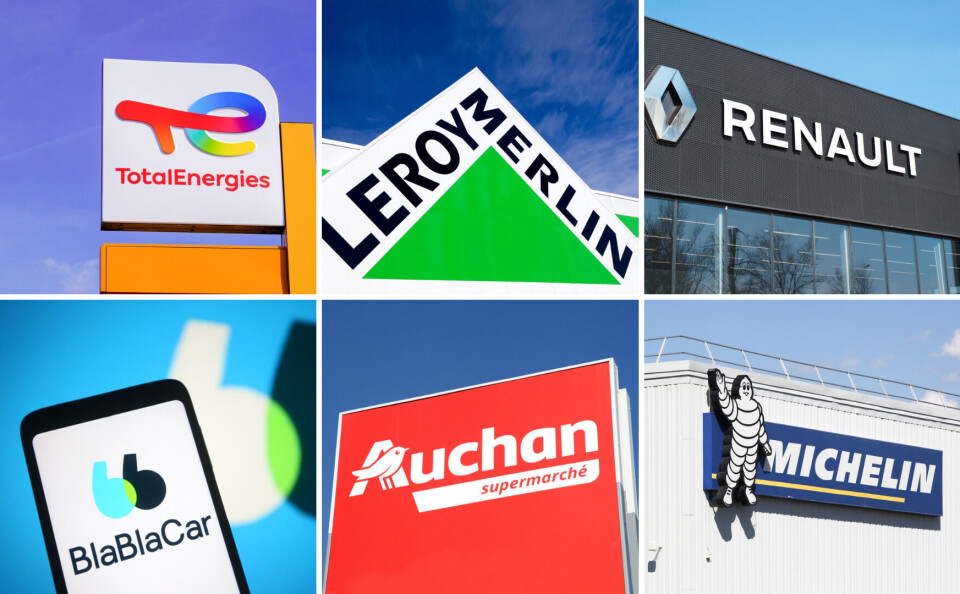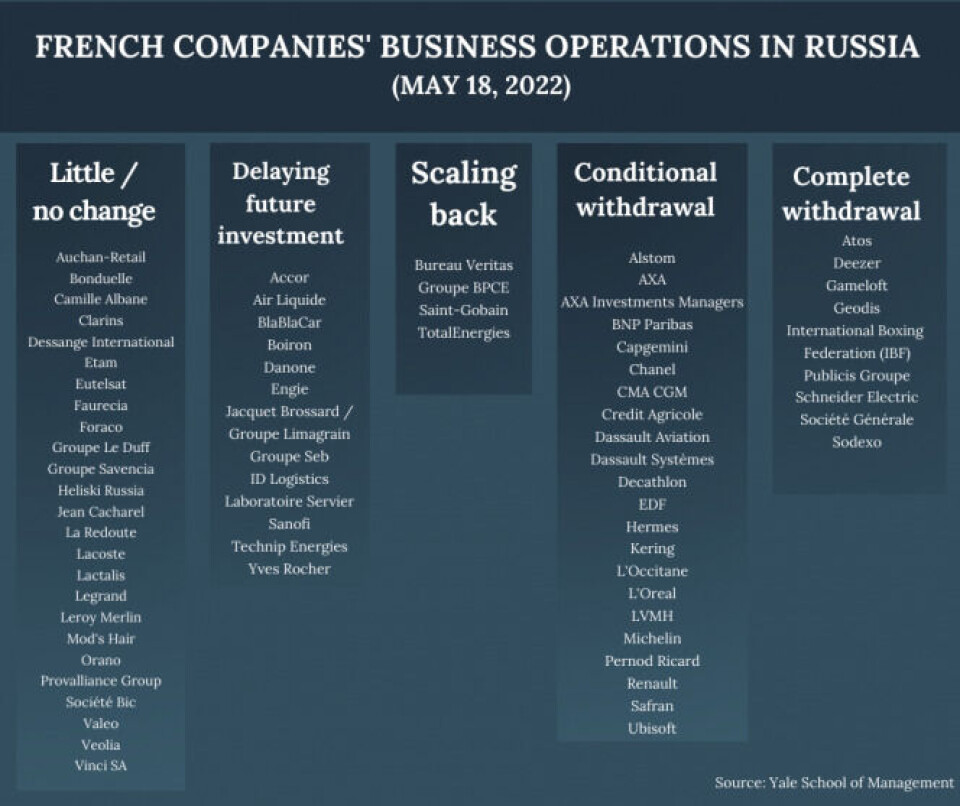-
‘Medical deserts’ major issue in upcoming local elections in France
Access to healthcare is now a more pressing concern than education, mayors say
-
‘Digital ID’ to be accepted at French airports this summer
Users of the France Identité app will be able to board certain flights using ID on smartphone
-
Germany to prolong EU border checks: how travel from France is affected
Checks at land borders will take place until at least September 15, 2026
Which French companies have withdrawn from Russia (and which have not)
Data shows that France proportionally has more businesses still fully operating in Russia than many other countries, including the UK and the US

An ongoing study into international companies operating in Russia lists 53 large French companies that currently have or did have businesses in Russia at the start of the Ukraine war.
The data shows that 47% of the French companies listed have made no or little change to their business presence in Russia. This is a far higher proportion than many other countries included in the study, with no UK companies at all in this category (making no change), 14% of German companies in this group and 0.07% of US companies.
The study has been put together by a group at the Yale School of Management and was first published the week of February 28, shortly after Russia invaded Ukraine on February 24.
It is not exhaustive and is subject to change as it is regularly updated. The list is compiled using both publicly available data such as government reports, company reports and media reports, as well as non-public information from company insiders, whistleblowers, etc.
The French companies included on the list are all large businesses.
It places companies into five categories:
The chart below shows the French companies listed by the Yale study. It is accurate as of May 18, 2022, including the recent announcement by Renault to hand over all its Russian activities to entities controlled by the Russian government.
Read more: French company Renault pulls out of Russia: Why has it taken so long?

You can see the full webpage here listing all of the international companies monitored by the Yale study.
How many French companies are in Russia?
There are 160,000 people employed by 500 French companies operating in Russia, a 2021 report into Franco-Russian economic relations published by the French Direction générale du Trésor shows.
“French companies are particularly well established in the sectors of agri-food, finance, distribution, energy, automotive, construction / urban services, transport, aerospace and pharmaceuticals,” the report states.
Russia was France's seventh largest market outside the European Union in 2020, with exports to Russia reaching €5.2billion that year, the report also shows.
It should be noted that exact figures on the number of French companies and staff vary depending on the source.
For example, the French Ministère de l’Economie et des Finances reported 700 French subsidiaries in Russia, employing over 200,000 staff.
How are French companies reacting?
French banking group Société Générale announced its complete withdrawal from Russia on April 11. It had been operating in Russia through its subsidiary Rosbank and employed 12,000 staff.
Tyre manufacturing company Michelin announced the closure of its factory in Davydovo, near Moscow, on March 15. It falls into the Yale study’s fourth category, meaning it is suspended operations but keeping open an option to return to Russia.
Its investment into Russia is minimal, with the market only representing 2% of total sales and 1% of its global production.
Oil and gas company TotalEnergies has begun to scale back operations in Russia. It announced on April 27 an asset write-down of around €3.9billion in investment, principally from the Arctic LNG 2 mega project.
Carpooling company BlaBlaCar has announced an end to investment in Russia but is remaining present in the country. It has around 25 million Russian users.
The food products company Danone (category two on the Yale list) is maintaining “for the time being, the production and distribution of fresh dairy products and infant nutrition, in order to meet the basic food needs of civilian populations,” the company has stated.
It has 7,200 employees in Russia at 13 production sites and generates 6% of its turnover in Russia.
Dairy products company Lactalis is on category one of the Yale list, meaning it is essentially ‘continuing business as usual’. The company has said that it is remaining in Russia due to a need to fill the shelves of the shops where civilians buy their supplies.
Home improvement and gardening retailer Leroy Merlin is also in category one. It has 45,000 employees and 113 shops in Russia, where 18% of its global sales come from.
Another French retail group, Auchan, is similarly staying in Russia. It has 30,000 employees and 232 shops in Russia, with 10% of its global sales coming from there.
Yves Claude, the CEO of Auchan, has said the company’s choice to stay in Russia is a “human decision”.
He told Le Journal du Dimanche: “It is easy to criticise us but we are here, we are standing up and working for the civilian population.”
Read more: French group Auchan defends decision to stay in Russia as ‘human’
Read more: French sports brand Decathlon to close its shops in Russia
Read more: French company Renault pulls out of Russia: Why has it taken so long?
What are other countries’ companies doing?
UK
British companies have been far more active than French ones in taking action against Russia, information on the Yale list shows.
The Yale School of Management study lists 88 British companies active in Russia.
Of these, there are zero that are in category one, meaning continuing ‘business-as-usual’.
There are seven in category two (holding off future investments but continuing substantive business) and two companies in category three (scaling back some significant business operations but continuing some others).
There are 34 companies in category four (curtailing most or nearly all operations while keeping return options open).
However, over 50% of British companies listed (45 in total) have suspended all operations and completely withdrawn from Russia.
This includes British oil and gas company BP, which on February 27 announced its abandonment of a 19.75% stake in Russian oil giant Rosneft, a move that will result in charges of around €25billion, the company has stated.
In total, 89% of British companies listed by Yale have either completely or provisionally withdrawn from Russia.
Germany
There are 98 German companies listed by the Yale study. Of these, there are 14 each in categories one and two, 15 in category three, 36 in category four and 19 in category five.
It means that 56% of German companies listed by Yale have either completely or provisionally withdrawn from Russia.
US
The Yale study lists 387 US companies. Of these, 26 are in category one, 41 are in category two, 55 are in category three, 150 are in category four and 115 are in category five.
It means that 68% of US companies listed by Yale have either completely or provisionally withdrawn from Russia.
Related articles
France should ‘no longer need Russian gas within three to four years’
























